
Chicken cacciatore is a classic northern Italian dish that owes much of its flavor to simmering in a pan sauce of wine, tomatoes and chicken broth. While wine is a crucial component of this sauce, substituting sherry for the more traditional dry red wine will not detract from the richness or flavor of this dish, and in fact, can actually serve to enhance it.
Sherry 101
Sherry has a complex, toasty flavor that adds richness to any meat-based dish, especially stews. Of the fortified wines, or wines with a spirit added, including port and Madeira, sherry is considered the driest. Most knowledgeable cooks keep a bottle in their pantry due to its usefulness in a multitude of recipes. The extra alcohol helps keep it shelf-stable for much longer than table wine.
The Role of Wine in Cacciatore
Dry red table wine, which is standard in most recipes for chicken cacciatore, is used to create a lush pan sauce in which the chicken pieces simmer and then bake. It is the alcohol in the wine that allows the reduction of the liquid, since alcohol is chemically a sugar, and as it cooks over medium heat the sugar will thicken and caramelize. This thickened liquid gives the finished dish its signature velvety sauce.
The Alcohol Factor
If substituting sherry for red wine in the recipe, the additional alcohol will cause the liquid to thicken and reduce faster. Keep a close eye on the skillet and stir often to avoid sticking and burning. You might need to add a small amount of extra chicken broth to compensate for the thickening power of the sherry.
Avoid Cooking Wines
Although both sherry and red wine are available in grocery stores labeled as "cooking wines," avoid them at all costs. Cooking wines are usually poor quality, thin wines that are loaded with salt. Whether you choose to use red wine or sherry in your chicken cacciatore, use a wine intended for drinking. Even a $5 or $10 bottle of sherry or red wine will provide far superior results than the same amount of wine or sherry intended for cooking.
Related Articles

How to Reduce Wine With Sugar to a Glaze

How to Make Teriyaki Sauce

How to Cook With Rice Wine
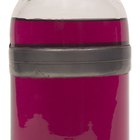
Alcohol Content of Cooking Sherry

How to Make a Blackbuck Antelope Roast

Uses for White Wine Vinegar
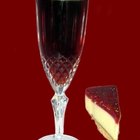
How to Use Bentonite for Clearing Wine

How Long Does It Take Alcohol to Cook ...
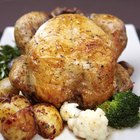
How to Smoke a Chicken in the Oven
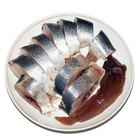
Herring in Wine Sauce

Does Alcohol Cook Out of Baked Goods?

How to Cook Down Apple Juice to Make ...
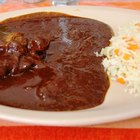
How to Make Mole Sauce

How to Cook Sauerkraut and Kielbasa ...
How to Cook Pre-Seasoned Porketta

How to Make Prosecco Sauce

Alternative to Cooking With Chicken ...

Does Simmering Ground Beef Make It More ...
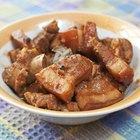
How to Make Filipino Chicken Adobo

How Much Is a Single Serving Size of a ...
References
Writer Bio
Andrea DeShazo has been writing and editing lifestyle articles since 2003. DeShazo has written for several major daily newspapers in Montana, Colorado and New Mexico. She has also taught writing to community college students on the Navajo Nation in northwestern New Mexico. DeShazo has a Master of Arts in journalism from the University of Montana, and currently writes about food and gardening from her home in the Raleigh, N.C. area.
Photo Credits
Jupiterimages/Comstock/Getty Images